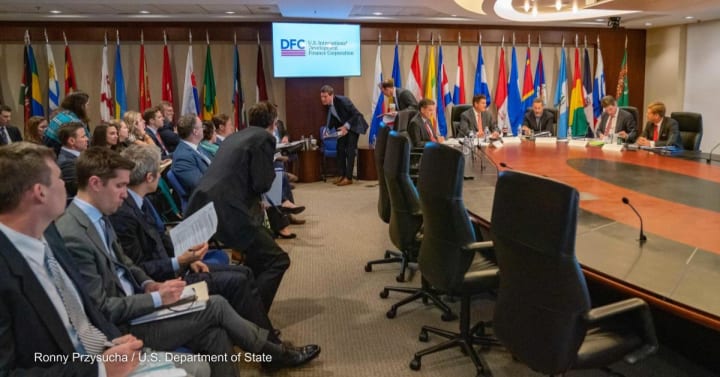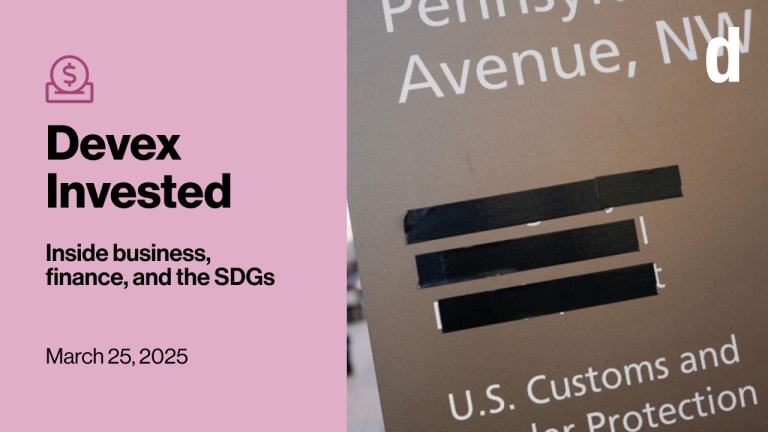
The U.S. International Development Finance Corporation has already accomplished so much in the short period it has been operational. Yet the U.S. Congress, the White House, other U.S. government agencies, and external stakeholders all want and expect it to do more, faster. But those same stakeholders, and DFC itself, have put constraints on what it can do. We need to change that so that DFC can do more of what it does so well.
DFC has become the U.S. government agency everyone expects to counter China and Russia, while also lifting millions out of poverty. It has been delivering on those expectations, supporting the world’s most innovative debt-for-nature swaps, bringing inexpensive financing to smallholder farmers, financing vaccine manufacturers, and helping European countries become energy self-sufficient.
Yet while I worked at DFC, many of us became frustrated that we had to turn away projects for what seemed like a new reason every day. I would jokingly say that I felt like Steve Martin’s character Navin Johnson in the movie “The Jerk.” Navin was a carnival worker running the “Guess Your Weight” booth. Someone approached him, looked at the wall of fantastic prizes, and asked what he could win.
Navin responded, waving at an increasingly small area: “Ah, anything in this general area right in here. Anything below the stereo and on this side of the bicentennial glasses. Anything between the ashtrays and the thimbles. Anything in this three inches. Right in here, this area, that includes the Chiclets but not the erasers.”
The carnival-goer walked away. Unfortunately, that’s how some react to DFC.
To start, DFC’s website lists over 100 countries where it cannot do business for a variety of reasons.
If the project is in a country that does not adequately protect workers’ rights — e.g., Thailand, Bangladesh, Sudan — then DFC can’t support it. There are a lot of people living in poverty in those countries, and the companies that DFC would finance would be required to respect workers’ rights as a condition of DFC financing. But DFC can’t do it.
If the project involves natural gas, unless it’s in Europe, where DFC has special authority to finance energy projects meant to counter Russia, DFC probably can’t support it. For example, even in Africa, where there still are 600 million people who have no access to electricity, there are so few exceptions for getting gas projects approved due to the U.S. administration’s climate policies and so few bankable gas projects that DFC has struggled to find Africa gas projects to finance despite its willingness to do so.
If the project uses solar panels, the company will have to prove that it will not use panels containing polysilicon from the Xinjiang region of China. That’s because there are allegations of forced Uyghur labor in Xinjiang. Unfortunately, many of the world’s solar panels contain polysilicon from Xinjiang. This restriction slowed down DFC’s financing of solar projects for about a year, which meant less energy access for low-income people and a slower renewable energy transition. I recently spoke with a U.S. company looking at setting up a panel manufacturing facility in Thailand, which would compete with China. Oh, it’s Thailand: DFC can’t finance it because of the workers’ rights issue in Thailand.
What about a railway? Well, if a government entity owns the railway, it’s likely to be a “no go,” unless there’s a concession to a private company to run the railway. But that’s not stopping China from financing roads, railways, and other infrastructure.
How about a vegetable canning business in Haiti that needs a $700,000 loan? Too small for DFC — too much staff time for a small deal and probably too expensive for the business to pay the expenses needed to comply with DFC’s legal, environmental, social, and governance requirements.
There’s a U.S. company manufacturing T-shirts in Honduras that wants to expand. It will create local jobs and likely discourage people from coming across the U.S. southern border from Mexico. Yes, that would be great, but how many jobs would be lost in the garment sector in the U.S.? So, probably not.
There’s a cool new safari lodge in Zambia that needs financing. It’s going to create 100 jobs in a remote area. Sorry, but too many people object if DFC finances hotels, particularly tourist hotels, even though hotels and tourism generate dollars that can be used for trade, improve labor standards, create value chains for local products, and even improve local construction safety standards. The safari lodge probably is a “no.”
Lithium processing in Chile? We all know the U.S. wants to play a greater role in ensuring a secure supply chain for batteries. Unfortunately, no. DFC can’t do it. Chile is a high-income country, so DFC can’t do business there.
OK. How about a Chiclets factory in Mexico? Seriously. Well, Mexico is an upper-middle-income country. The State Department first would have to determine that the project advances U.S. foreign policy interests and then DFC would have to determine that the Chiclets factory would provide substantial developmental benefits to the country. I guess it’s probably a “no” to the Chiclets factory in Mexico.
That also, unfortunately, leaves Navin Johnson with nothing to give away at his “Guess Your Weight” booth.
How is DFC to advance the U.S. government’s foreign policy and development interests with so many limits on what it can do — restrictions from Congress, the White House, its board agencies, and other stakeholders, and some self-imposed limits? How is DFC supposed to counter China? China’s overseas financing agencies can work in almost any country they want on almost any kind of deal.
How is DFC to advance the climate agenda or help billions of people in the lowest-income countries of the world emerge from poverty if it’s so hamstrung?
Despite these restrictions, DFC is doing a great job, even with limited staff and resources, to advance development and U.S. foreign policy. It has supported more and more deals each year in the lowest-income countries, and the amount of money that it has committed also has increased. It has had a tremendous development impact.
But DFC can do so much more if allowed to, and if properly resourced.
That means making some internal changes and reducing legal restrictions. We need to get this right, and there’s an opportunity to do so with DFC’s upcoming reauthorization.
Editor’s note: ODI North America is a private U.S.-based, independent, nonpartisan 501(c)3. The views of the author do not reflect institutional views or the views of other related, but independent, ODI entities.




